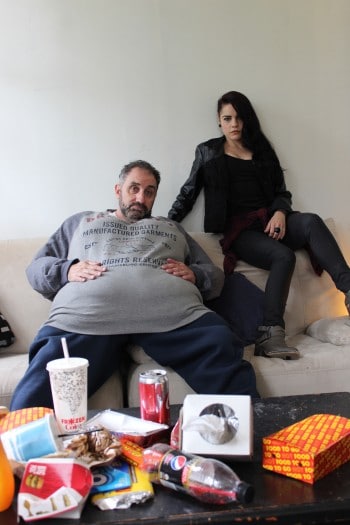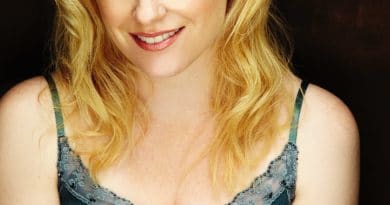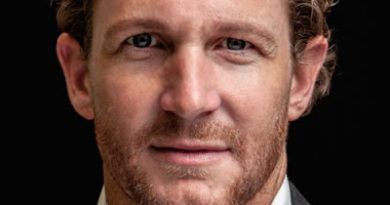Unlike Anything: Talking Old Fitz’s The Whale with Shane Anthony
Director Shane Anthony is bringing The Whale to life at Sydney’s beloved black box, The Old Fitz Theatre, in conjunction with the Sydney Gay and Lesbian Mardi Gras. It opens tonight. Written by Samuel D. Hunter, the play explores the life of tragically isolated man, and what happens when he can no longer avoid the trauma in his past. It’s a deeply sad but sharply funny play.
We sent a few questions to Shane Anthony about the production, the challenges of addressing both the lightness and the darkness of the script, and how something terribly depressing on stage might become ultimately uplifting for the audience.

When did you first come across The Whale? Can you tell us a little bit about the play – and what about it made you want to direct it?
Andrew Henry of Redline Productions emailed me the script earlier this year and asked for my thoughts. It was immediately clear that The Whale was unlike anything I’d read before. Charlie, a 600 pound, morbidly obese gay man is at the heart of the story. I imagine watching Charlie in his dying days will be as confronting and challenging for Sydney audiences as it has been for audiences in other countries where the work has already received seasons.
The fact that the playwright, Samuel D Hunter, is able to bring a large dose of humour to this dark situation is testimony to his skill as a writer. The piece is simultaneously devastating, funny, uplifting, hopeful and magical. It’s a great combination to tackle as a director.
What are the challenges – and benefits – of staging The Whale in a tiny theatre like the Old Fitz? Does your knowledge of the space alter your approach to the play overall?
The Fitz is a great space to direct this big play. Although it’s an intimate venue to start with, I’ve decided to cut the stage area in half and expand the audience creating a corner stage. I’m interested in working with compression of space in the staging of The Whale. Characters from Charlie’s past tumble into his lounge room and he is forced to address a host of secrets, taboos, lies and misconceptions that he has evaded for the last 15 years. I’d like for the audience to feel as if they are falling into the space with them, almost on top of Charlie.
I know the space well, having staged Songs for the Fallen at The Fitz in 2013 as the last work under TRS’s reign. I was keen to transform the tiny venue back then and I plan to do the same again with The Whale.
Tell us a little bit about the cast you have assembled for the play.
Can I say they are fucking wonderful?! They are. We (Redline Productions and I) invested several months in casting, because I was clear that without the right casting mix the play could fall over. It was particularly important to cast someone with an honesty and truth that could feasibly play morbidly obese – obviously with the assistance of some great costume designers and makers. Keith Agius brings a wonderful depth and humanity to this role. Meredith Penman, Hannah Waterman, Chloe Bayliss and Alex Beauman are such generous, talented and curious actors. The cast are all pulling and stretching the text in the most exciting and unexpected ways. I can’t wait for audiences to see their work.
This play is about a largely isolated, alarmingly obese man in Idaho, and there are a few other figures through the play, like a Mormon missionary, who are so often portrayed in the media just for laughs. How are you approaching these people to afford them their humanity?
It would be easy to judge and condemn some of the less attractive actions and behaviours of many of the characters in The Whale. It’s been important to me that we look beyond these actions to understand their cause and their motivation to elicit understanding from an audience. Most of the characters in the play are stuck in patterns of behaviour fuelled by fear and ignited from specific traumatic events. As a result they are stuck in the past, unable to live in the present and paralysed from moving forward. I think this is an idea that most people can relate to or have experienced at some point in their life.
Ultimately all of the characters are more complex than their surface traits and behaviours. Just as in life these characters are full of contradictions, vulnerabilities and flaws and it’s these qualities that make them honest and human. There is a certain beauty in that.
The Whale will play as part of the Sydney Gay and Lesbian Mardi Gras. Are you drawing on any other queer works for inspiration as you work on The Whale? What unique qualities do you think The Whale is bringing to the festival program?
There have been many sources of inspiration during research and rehearsals for The Whale. Some have been specifically queer focused, but most have been about relationships, trauma, grief and loss. I don’t see this as a politically gay play. I see it as a play that happens to have a gay character at its core.
Ultimately, how do you hope your audiences will feel after they have seen The Whale?
I would like them to feel hopeful and inspired to live life with the courage to face fears that might arise in their lives.
The Whale will play at the Old Fitz from 2 February – 4 March 2016. For tickets and more information, visit the Old Fitz’s website.




